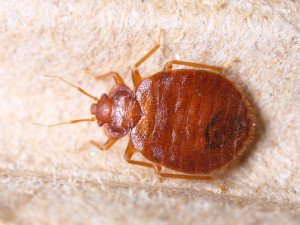 You’ve heard the saying night night don’t let the bedbugs bite…well that’s no joke in Larry Jack’s world.
You’ve heard the saying night night don’t let the bedbugs bite…well that’s no joke in Larry Jack’s world.
Larry is the owner of JAX Pro Pest Control serving the Phoenix, Arizona metropolitan area. He has been involved in pest control since 1988 and specializes in a growing problem here in the United States, the rise of bedbugs.
In this interview Larry explains what bedbugs are, how someone might get bedbugs, and more importantly, how they get rid of them.
QUESTION: How did you get involved in bedbug control?
LARRY JACK: Well it started 10 years ago being involved in the pest control industry. We have several hospitals and nursing homes and medical facilities we provide pest control services for locally and we started getting calls about bedbug infestations in commercial applications like this.
When we recognized the growing problem, we immediately began researching solutions and attending trainings on controlling bedbugs. One of the resources we found was a Dr. Austin M. Frishman with Purdue University. He’s been in pest control since the 40’s and has multiple degrees in etymology and toxicology; he’s really the expert that all of us pest control companies look to. His research was instrumental in eradicating bedbugs for decades through the use of DDT.
With DDT no longer being used, bedbugs are making a strong come back now and recent advances in chemical applications are making it easier to eliminate them.
QUESTION: Larry, what type of clients do you help with bedbugs?
LARRY JACK: We help commercial, residential and even industrial clients with bedbugs. There really isn’t a specific demographic of people susceptible to a bedbug infestation. We’re commonly in hospital rooms, hotels, and other places where bedbugs are more likely to be seen. We also help the homeowner struggling to get rid of a bedbug problem.
QUESTION: What was your first experience with bedbugs?
LARRY JACK: The first time I heard about bedbugs here in the Valley was on the news one night. An opera star staying at the Ritz Carlton had to cancel her performance because of bedbug bites. You wouldn’t expect bedbugs to be in such a luxurious hotel but bedbugs don’t discriminate.
My company first dealt with bedbugs in a hospital. I received a call from the hospital on a Sunday. They had identified bedbugs on a patient and weren’t sure where to turn.
Upon arriving at the hospital, I found that the staff had placed the patient’s personal belongings in buckets of water because they weren’t sure exactly what to do. It was then I realized that this is an issue that was going to take a great deal of education not only on my part, but educating the public as well.
QUESTION: What exactly is a bedbug?
LARRY JACK: A bedbug is a small nocturnal insect that lives by feeding on the blood of humans and other warm-blooded creatures. They are found all over the world, generally wherever humans live.
Bedbugs are pretty small; an adult bedbug might grow to be the size of 4-7mm. They are a reddish-brown color and their shape is flat and oval.
QUESTION: How do people get bedbugs?
LARRY JACK: The typical infestation is commonly caused by coming into contact with infested furniture in hotels, motels, and other temporary lodging facilities. Bedbugs can be passed on from used clothing or furniture. It doesn’t matter how clean a person is, it won’t stop the spread of the infestation directly.
QUESTION: Is there a common misconception that people have about bedbugs?
LARRY JACK: A common misconception is that bedbugs come from an unkempt or a dirty environment. It’s true that cleanliness, by eliminating some of the places bedbugs hide, can slow down an infestation but bedbugs are often transported by humans from one place to another regardless of how clean they are or how clean or dirty their living environment is.
QUESTION: You mentioned that bedbugs feed on human blood. What are the feeding habits of bedbugs?
LARRY JACK: When a bedbug bites a person, it injects an anti-coagulant, anesthetic and then collects your blood. Generally a bedbug will feed for about five to twenty minutes before returning to its hiding place and may bite several times during a feeding. They generally feed at night but can be seen anytime especially if an opportunity to feed happens.
QUESTION: What should everyone know about bedbugs?
LARRY JACK: An important bit of information to know about bedbugs is that they can survive for up to eighteen months without feeding even though they seek blood every five to ten days. Often times a homeowner will think they’ve eradicated their bedbug problem only to have the pesky creatures come back again.
QUESTION: Are bedbug bites dangerous? What about for the young or elderly?
LARRY JACK: Thankfully, bedbug bites are not dangerous but rather annoying. When bedbugs first became known as a problem in the United States, there was a lot of concern that they may be able to spread disease and blood borne pathogens from one person to another.
While they can’t spread disease, they can cause skin irritation or rashes if a person is a bit sensitive, so it’s a good idea to take care of an infestation as soon as possible. Some people can be allergic to bedbug bites, with the bites irritating the skin and itching while others might barely notice the bites at all. Bedbug bites typically take anywhere from a few days to a few weeks to go away.

